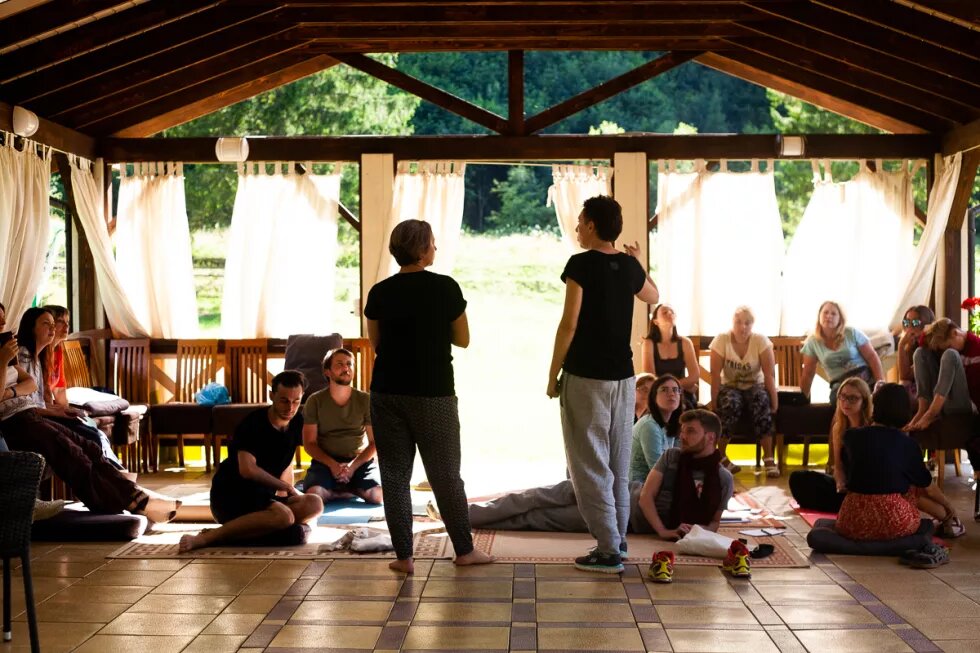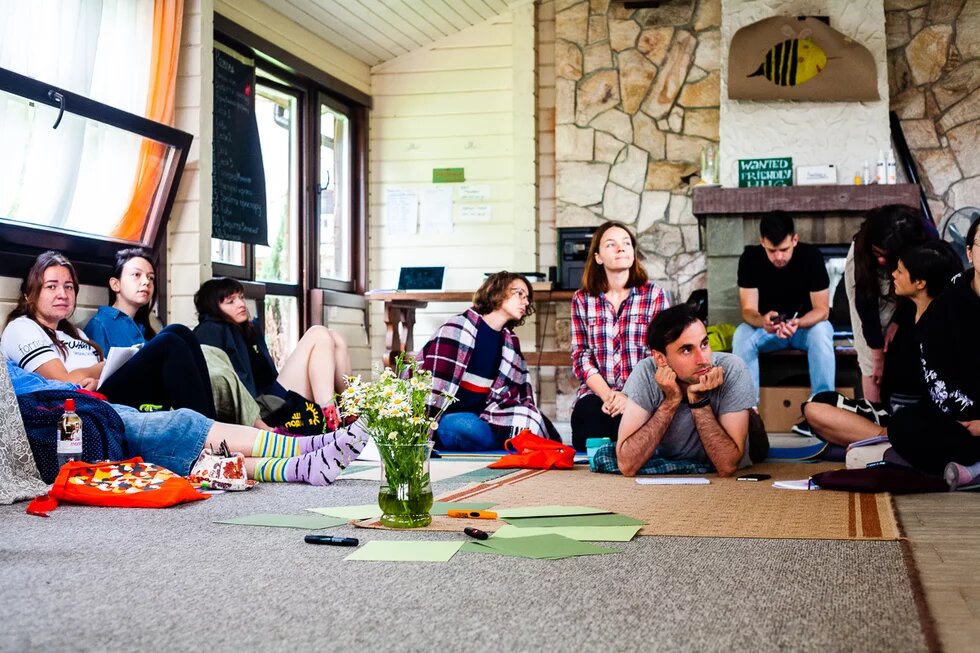

The second Green Academy — a summer school on strategies and principles of German Green democrats — took place between June 30 and July 7. For a week, 24 participants from all over Ukraine modelled a small green society with our help, researching non-violence, environmental sustainability, gender equality and participatory practices together.
At Green Academy 2019, we:
1. Built a community. We created a friendly circle of people from different backgrounds united by common values and with interest in green ideas.
2. Maintained a green lifestyle. To ensure a better understanding of green ideas, they were made part of the school life as much as possible: we sorted waste, interacted in a non-violent way, and created the curriculum together.
3. Formed the curriculum and the educational space of the academy in a participatory way, together with the participants. The open space format enabled the participants to suggest their own green subjects for discussion and to share their knowledge.
4. Tried out the opportunities of informal education. To understand green approaches better, we tested various educational formats: critical discussions of a certain subject in groups, modelling of green logic in games.
5. Looked for green solutions for everyday life. To make sure the green principles would not be left to theory alone, we tried to adapt the shared knowledge to everyone’s context. We compiled a green checklist — a list of questions that can help us “test” how green we ourselves and our activities are on the personal, corporate and social levels.
If you’d like to find out more, here it is:
І. Selection
At the Academy, we gathered researchers, artists, journalists, urban scholars, environmental experts, activists, and managers. It was done on purpose, since one of the Academy’s goals is to form a diverse community and introduce people from various spheres and professions united by common values.
We received 415 applications from all regions of Ukraine. Out of them, we selected 24 participants. We tried to be green about that, too: we selected Academy participants regardless of their age (the only requirement was that only adults were eligible), gender, ethnicity or other characteristics.
To ensure equal opportunities for representation for different groups, out of two equally strong applications, we gave preference to applications from small towns or from representatives of vulnerable groups and people whose access to educational opportunities we believed likely to be more limited.
II. Content
“The mosaic was coming together for a week during the Green Academy in the Carpathians. It turns out that my regular interests, such as non-violence, environmental sustainability, gender equality and participatory practices, share the same basis on a fundamental level,” says Iryna Salnyk, one of the Academy participants.
At first glance, the idea to research non-violence, environment, gender equality and participation together may seem strange. To understand why it makes sense, let’s look back at the history of the green political movement. Here, we are assisted by speaker Vesna Jusup, Head of Policy, Strategy and Capacity Development Unit of the European Greens.
At the end of 1970s, the green movement emerged in Germany, uniting protest groups with diverse ideas around several common goals. The movement was based on preventing environmental destruction and excessive consumption of natural resources in order to save the planet and humankind for the future generations. Hence, the name of the movement — the Greens. Yet, environmental awareness is far from the only value promoted by the German Greens: they also envisioned a fair society, free from discrimination, hierarchical structure, and violence. Among German political movements, the Greens were the first to speak about the links between the environment, justice and future of the humanity for its sustainable development.
Today, there is a Green Party in most European countries. Vesna explains why green ideas are gaining traction in Europe and how national green parties work together at the EU level.
“Green values or green discourse are a way to look at a problem, not a set of subjects or ready-made answers for any occasion,” Vesna points out. For EU Greens, there is no such thing as a “green subject.” The green optics is based on a range of values and principles which is what we are studying: non-violence, environmental awareness, participation and gender equality.
Together with speaker Oksana Potapova, facilitator of educational and dialogue spaces, feminist and co-founder of Theatre for Dialogue CSO and women’s initiative One of Us, we analyse how we can interact with ourselves and in a group in a more empathetic and non-violent way. Going from the personal to the political, we also study structural violence and its sources, analyse our privileges and ponder how our social interventions may reinforce the existing inequality or, conversely, create an alternative and promote the principles of social justice in practice.
Ivan Verbytskyi, project manager and urban development analyst with CEDOS think tank, tells about the development of grassroots democracy in Ukraine and about levels and tools of participation. With him, we research the connection between inequality and participation and why awareness and expertise are critical elements of participation.
With Yulia Makliuk, environmentalist and craftivist*, we speak about the stages and dynamics of the global environmental crisis and identify ways for each and every one of us to contribute to resolving this crisis daily.
We discuss gender equality and feminism with Anna Dovgopol, coordinator of the gender program of Heinrich Boell Foundation, Kyiv Office — Ukraine, and co-editor of the Gender in Detail website. Anna shares the story of the feminist movement in Ukraine and worldwide, explains the key notions in gender studies: gender and queer. We discuss how all-encompassing the subject of gender equality is and how any activity or project has gender issues to consider.
III. Format
Since Green Academy is a small model of a green society, we tried to organise the educational space in line with the green values: set up a few waste sorting stations on site, used eco-friendly products, did not eat meat, provided all participants with an opportunity to give feedback on the educational process every day, to make changes and proposals.
The content of each Green Academy is unique, particularly because we form the curriculum together with the participants, taking into account their requests and suggestions. Participatory education is a format in which the learner has the right and comfortable conditions to influence the content and process of education. Thanks to this approach, knowledge is no longer perceived as something distant and foreign. Instead, the information resonates with contexts in which the Academy listeners work.
Besides, we made sure there was time free from lectures and practical classes at the Academy, so that the participants could organise their own activities. The open space format introduced this year enabled the participants to offer their own “green” subjects to discuss and to share their knowledge with the group.
We worked in a friendly space, tolerant to different opinions and views. To achieve this, we dedicated several hours to getting acquainted profoundly: shared stories of our activism, spoke about needs, expectations from the Academy, and our fears.
Lectures were combined with group classes and games to put the newly obtained knowledge to practice. For this, we are thankful to Academy facilitator Mariana Zaviiska and Olena Angelova.
IV. Impressions
It makes us happy when the participants say that the Academy was interesting and useful for them:
V. Acknowledgement
We are grateful to the participants for sincerity in common production of knowledge on green approaches. To the applicants — for their interest in green values and subjects. To the team of trainers and facilitators — for building a sensitive educational process where it was safe and comfortable to share opinions and feelings, express criticism, and interact without violence or manipulations.
To the team of the event agency INSHI (“Others”), we are thankful for creation of an educational space friendly to the environment and diversity and openness to green experiments.
A call for applications for Green Academy 2020 will be published on the Heinrich Boell Foundation, Kyiv Office — Ukraine page on Facebook in March 2020.
More photos from the event can be found here.
*Craftivism is the use of arts and crafts to initiate social change or resolve social problems.
Text and photos by Maria Matiashova








